Related Research Articles

Flavius Josephus was a Roman–Jewish historian and military leader. Best known for writing The Jewish War, he was born in Jerusalem—then part of the Roman province of Judea—to a father of priestly descent and a mother who claimed royal ancestry.
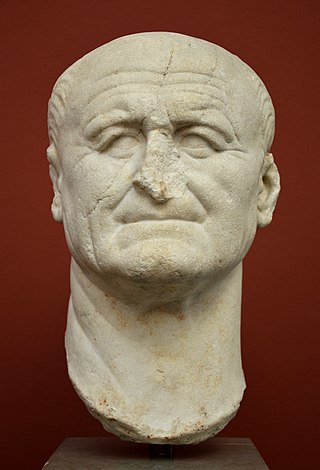
Vespasian was Roman emperor from 69 to 79. The last emperor to reign in the Year of the Four Emperors, he founded the Flavian dynasty, which ruled the Empire for 27 years. His fiscal reforms and consolidation of the empire brought political stability and a vast building program.
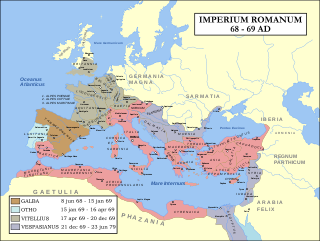
AD 69 (LXIX) was a common year starting on Sunday of the Julian calendar. In the Roman Empire, it was known as the Year of the consulship of Galba and Vinius. The denomination AD 69 for this year has been used since the early medieval period, when the Anno Domini calendar era became the prevalent method in Europe for naming years.

Flavius Valerius Constantius, also called Constantius I, was a Roman emperor from 305 to 306. He was one of the four original members of the Tetrarchy established by Diocletian, first serving as caesar from 293 to 305 and then ruling as augustus until his death. Constantius was also father of Constantine the Great, the first Christian emperor of Rome. The nickname "Chlorus" was first popularized by Byzantine-era historians and not used during the emperor's lifetime.
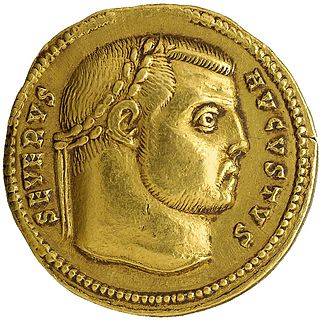
Flavius Valerius Severus, also called Severus II, was a Roman emperor from 306 to 307. After failing to besiege Rome, he fled to Ravenna. It is thought that he was killed there or executed near Rome.
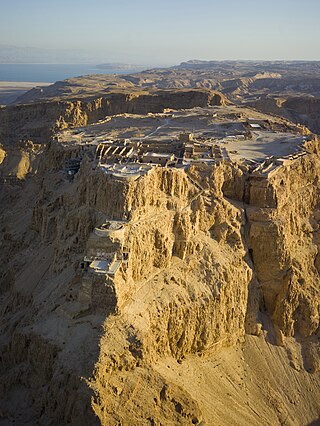
The siege of Masada was one of the final events in the First Jewish–Roman War, occurring from 72 to 73 CE on and around a hilltop in present-day Israel.
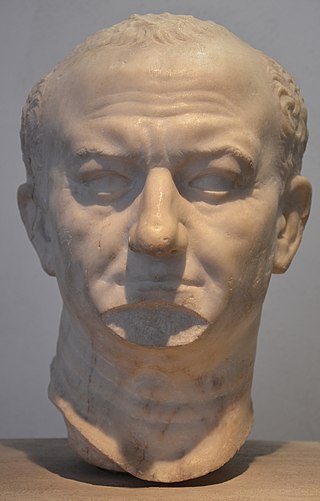
The gens Flavia was a plebeian family at ancient Rome. Its members are first mentioned during the last three centuries of the Republic. The first of the Flavii to achieve prominence was Marcus Flavius, tribune of the plebs in 327 and 323 BC; however, no Flavius attained the consulship until Gaius Flavius Fimbria in 104 BC. The gens became illustrious during the first century AD, when the family of the Flavii Sabini claimed the imperial dignity.
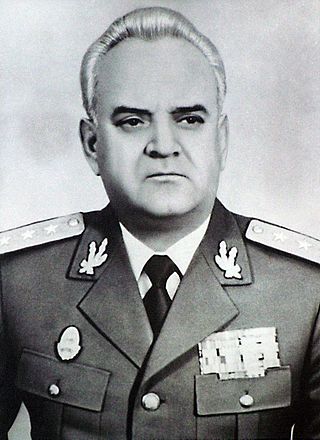
Vasile Milea was a Romanian politician and military general who was Nicolae Ceaușescu's Minister of Defence during the Romanian Revolution of 1989 and was involved in the reprisal phase of the Revolution that caused the deaths of 162 people.

In ancient Arab mythology, Azizos or Aziz is the Palmyran Arab god of the morning star. He is portrayed as riding a camel with his twin brother Arsu, although one source says that "Azizos is depicted as a horseman, whereas Arşu is a cameleer." He was venerated separately in Syria as god of the morning star, Phosphoros, in company with the astral god Monimos, Hesperos.

Machaerus was a Hasmonean hilltop palace and desert fortress, now in ruins, located in the village of Mukawir in modern-day Jordan, 25 km (16 mi) southeast of the mouth of the Jordan River on the eastern side of the Dead Sea. According to the Jewish-Roman historian Flavius Josephus, it was the location of the imprisonment and execution of John the Baptist. According to the chronology of the Bible, the execution took place in about 32 CE shortly before the Passover, following an imprisonment of two years. The site also provides the setting for four additional New Testament figures: Herod the Great; his son, Tetrarch Herod Antipas; his second wife, Princess Herodias; and her daughter, Princess Salome.

The Constantinian dynasty is an informal name for the ruling family of the Roman Empire from Constantius Chlorus to the death of Julian in 363. It is named after its most famous member, Constantine the Great, who became the sole ruler of the empire in 324. The dynasty is also called Neo-Flavian because every Constantinian emperor bore the name Flavius, similarly to the rulers of the first Flavian dynasty in the 1st century.
Flavius Vladimir Stoican is a Romanian professional football manager and former player, currently in charge of Liga II club CSM Reșița.

This is a list of US states by gun deaths and rates of violence. In 2021, there were 26,000 gun suicides and 21,000 gun homicides, together making up a sixth of deaths from external causes. Gun deaths make up about half of all suicides, but over 80% of homicides.

The praetorian prefecture of the East, or of the Orient was one of four large praetorian prefectures into which the Late Roman Empire was divided. As it comprised the larger part of the Eastern Roman Empire, and its seat was at Constantinople, the praetorian prefect was the second most powerful man in the East, after the Emperor, in essence serving as his first minister.

Flavius Virgil Domide is a Romanian former football striker.

Kasserine is the capital city of the Kasserine Governorate, in west-central Tunisia. It is situated below Jebel ech Chambi, Tunisia's highest mountain. Its population is 114,463 (2020).

Flavius David Daniliuc is an Austrian professional footballer who plays as a centre-back for Red Bull Salzburg on loan from Serie A club Salernitana and the Austria national team.
The Syagrii were an aristocratic family in late antique Gaul during the fourth and fifth centuries. The family was particularly associated with Gallia Lugdunensis (Lyons), and their family seat was located in the area of Augustodunum (Autun).
References
- ↑ Clinton, Henry Fynes. Fasti Romani: Appendix. From the death of Augustus to the death of Heraclius. Oxford University Press. p. 124. Retrieved Feb 22, 2021.
- ↑ Pagi, Antoine (1682). Dissertatio Hypatica, seu, de Consulibus Caesareis ex occasione . Retrieved Feb 22, 2021.